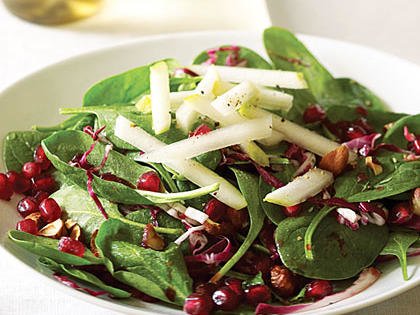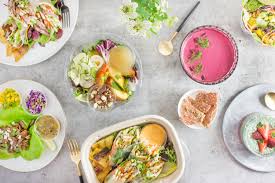I changed my life dramatically when I began batch cooking. For those of you who aren’t familiar with this term, “batch cooking” is the practice of spending a few hours one to two times a week prepping, cooking, and properly storing food so you have ready-to-go healthful meals at your fingertips. This is a practice I loosely began in college, mainly because most of my friends were busy watching football on Sundays (a sport I don’t like), and I often had no one to hang out with. Somehow I got the idea to spend my Sundays cooking, which resulted in me feeling rewarded with a fridge full of healthy meals I could eat throughout the week. In the decades since, I’ve become much more practiced and savvy at batch cooking, and I believe it is one of my keystone habits that helps my entire week unfold somewhat predictably and flow smoothly.
Everyone’s lives are a little bit different, but I believe batch cooking is the key to consistently eating healthy for most people. I believe this because most of the reasons people give me for not eating well or “slipping up” sound something like this:
- “There was nothing in the fridge.”
- “We didn’t have enough time to make anything; we only had 30 minutes before it was time to take the kids to dance/piano/violin lessons.”
- “I didn’t have anything to pack for lunch and the only place near work is (insert xyz fast food restaurant).”
- “We’re just so tired when we get home from work; cooking feels like too much after a long day.”
- “We’re ravenous by the time we get home. It’s easier just to stop somewhere quick and grab something.”
You get the idea. I’m guessing you’ve heard yourself saying something similar. Heck, I’ve said a couple of these things before, but those occasions have been rare because I’ve established the keystone habit of batch cooking.
Home cooking is essential to health, but it’s a skill that, unfortunately, many people have lost. You and your family will eat whatever is readily available in the refrigerator or cupboards. If you don’t cook regularly, you’ll rely more on processed foods and restaurant food, which are usually not the best choices for our health. There’s nothing wrong with having these things sometimes, but I discourage people from eating this way daily. I’m excited to help rekindle the art and joy of cooking in your life.
Let’s walk through some potential obstacles/excuses you may have to home cooking, and see if we can clear some space in your life for this essential habit to emerge:
The #1 reason people give for not cooking is a lack of time.
Many of us have allowed our lives to become very busy and fast-paced. In fact, it takes solid boundary setting skills and clear intentions to NOT allow our lives to become overbooked. Take a few minutes now to evaluate when you could set aside 3-4 hours to cook during the week (you’ll likely become faster the more you practice). If 3-4 hours is a stretch, find 2 hours. You can get a solid start in 2 hours. As I mentioned above, Sundays are usually a great day for me to knock out a bunch of meals. If I make other plans on Sunday, then I immediately figure out an alternate time to cook; sometimes it’s Saturday, sometimes it’s Monday late afternoon/evening. Just like anything else that’s important to you, you will need to schedule it in order for it to happen, and you might have to say no to something else in order to squeeze your cooking in.
The #2 reason people give for not cooking is that they don’t know how.
Cooking is a skill just like any other skill, so if you don’t know how to cook there is simply no way around the learning process. Start with a simple recipe and give yourself the space to learn and make mistakes. Everybody burns things and attempts a recipe or two that doesn’t turn out. Every mistake gets you that much closer to figuring it out next time! Consider taking a knife skills class or a Cooking 101 class to help get you started. Keep track of your questions and lean on me, or ask a friend who likes to cook to come over and show you some easy tricks. You can also ask Google or tap YouTube for how-to videos about anything you find confusing.
The #3 reason people give for not cooking is that they don’t enjoy it.
One common reason people don’t enjoy cooking is they’re too busy and don’t give themselves the time to cook a nice meal – so it becomes a stressful activity. Nobody enjoys that. A second common reason is that they simply haven’t practiced enough so they lack confidence. We already addressed these two obstacles above. The other reason I hear somewhat frequently comes from people living alone who say, “It’s no fun to cook for myself.” My response is always, “Let’s explore why that is.” To cook for oneself is to love oneself. You are worthy of quality, home-cooked meals. You are worth the time and effort. It might feel like a chore, but it is one of the most important things you can do to take care of yourself, so I encourage you to start dismantling that story you have.
All of that said, I empathize with people who don’t want to cook because, believe it or not, there are days when I don’t feel like cooking either. If my week has been unusually busy, I’ll definitely feel resistance to spending my afternoon doing this weekly chore, but because it’s become a strong habit I rarely give myself the option of not doing it.
I’ve also figured out how to increase the batch cooking “fun factor” by:
- Playing music I love while cooking. I have so much fun pulling out old CD’s and jamming out while preparing our food for the week.
- Playing Ted Talks or other YouTube videos on topics that interest me. If you’re into a TV or Netflix show and you have the means to play it in your kitchen, watch/listen while you cook. Nobody said we have to chop, prep, and cook in silence.
- Cooking with a friend. Try inviting a friend over to batch cook with you. Several of my clients have played with this and have had a lot of fun combining their weekly meal prep with some social time. Instead of going out for a happy hour, knock this task off your to-do lists together and catch up while being productive.
Becoming a Batch Cooking Boss
Cooking once and eating once is a recipe for spending a lot of time in the kitchen. Batch cooking allows you to make several meals at a time, speed through your clean up all at once, and will then give you several days or more away from cooking (depending on the size of your family). Also, if you’re someone who makes several trips a week to the grocery store, you’ll likely cut that back to one or two bigger trips.
Steps for Batch Cooking
- Choose meals you would like to make for the week and the day(s) and time(s) you will prepare them.
- Use a grocery list tailored to your family’s needs.
- Shop once a week.
- Batch cooking includes making your meals and also cutting up your greens, veggies, fruits and preparing any snacks for the week.
- Keep a well-organized paper or electronic copy of your recipes. Make notes after making a new recipe that you enjoy so that you feel confident making it again.
(If you do this, eventually you’ll have a resource binder full of recipes you love and feel confident making.)
- Tip: I always double a recipe. If it ends up making more than we can comfortably eat, I store a few portions away in the freezer immediately so I don’t have to worry about it going bad. Having prepared food in the freezer is as good as money in the bank.
An Example of my Weekly Batch Cooking/Meal Prep:
Though the food I make varies each week, below is an example of what my batch cooking might look like:
- 1 big pot of soup
- 1 big batch of brown rice or quinoa (about 2-3 cups cooked)
- 1 roast or baked hash/casserole (a bunch of vegetables combined with some meat and broth)
- 1 vegetable egg bake (sort of like a quiche but without the crust)
- a bunch of washed and chopped up veggies, ready to stir-fry or snack on at any point during the week (broccoli, kale, cauliflower, cabbage, etc.)
- In addition, we also buy plenty of fruit and a big pre-washed tub of salad greens
(Remember, you could start with just one of these items; you don’t have to become a batch cooking boss on your first try.)
Stephanie Meyer, a Twin Cities food photographer, stylist, and author who offers meal planning subscriptions, bases her subscriptions on the following template, which may be helpful to emulate (or you could buy her subscription for a while to get a jumpstart):
- Saturday or Sunday (Batch Cook Day): Classic Roast Dinner
- Mondays: Pastas/Casseroles
- Tuesdays: Tacos/Wraps
- Wednesdays: Hashes/Stir-fries
- Thursdays: Entree Salads
- Fridays: Soups/Stews
The Benefits of Batch Cooking:
- Life goes much smoother.
- You reduce stress because eating is no longer an afterthought.
- You and your family become more efficient in your work because you’re running on high quality fuel at regular intervals.
- Your thoughts improve because what you eat plays a very significant role in your thoughts. Anxiety levels will drop.
- When your thoughts improve, your mood improves.
- When your mood improves, you feel more confident and can move forward in your life in a much more positive, productive way.
You will need to feed yourself for the rest of your life. Consider investing more time in food planning, cooking, and learning what foods your body feels best eating. It’s a skill that will repay you for the rest of your life.




Follow